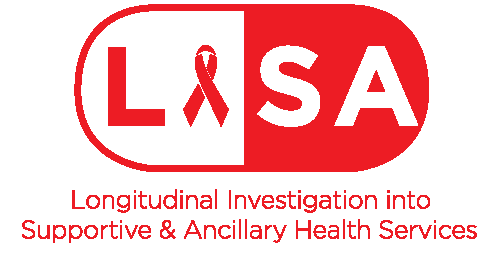LISA
The Longitudinal Investigation into Supportive and Ancillary Health Services (LISA) project is a three-year initiative of the BC-CfE funded by the Canadian Institutes of Health Research (CIHR). The objective of the LISA project is to better understand how people living with HIV and taking HAART are doing in terms of supportive services use, socio-demographic factors, and quality of life. Through face-to-face interviews, LISA gives people an opportunity to voice the successes and challenges they experience in their daily lives.
As of January 2010 the LISA study is now closed for recruitment. Findings are still emerging.
- AIDS Vancouver
- British Columbia Positive Living Society
- Dr. Peter Centre
- Healing Our Spirit, BC Aboriginal HIV/AIDS Society
- John Reudy Immunodeficiency Clinic, St. Paul’s Hospital
- MAT/DOT, Downtown Community Health Centre
- Oak Tree Clinic, BC Women’s Hospital
- Portland Hotel Society
- Positive Women’s Network
- Spectrum Health Clinic
- Vancouver Native Health Society
- Vancouver Injection Drug Users Study
- Heart of Richmond
- Positive Haven, Surrey North Community Centre
- AIDS Vancouver Island
- Cool Aid Medical Clinic
“The way I see it”- LISA sub-study
“The way I see it” is a qualitative sub-study of the LISA project that examines the impact of housing on health as seen through the eyes of a team of Community Researchers — people living with HIV and passionate about housing research and advocacy. The project used Photovoice methods to develop an understanding of the relationship between housing and health that is grounded in the lived experiences of the Community Researchers.
From June 2011 to June 2013 the team engaged in discussion about how their social and physical environments impact their health, and took photos to illustrate their experiences. Collectively their narratives convey the importance of stable, safe, affordable housing in safeguarding people’s health and well being. The project aimed to increase people’s understanding of vulnerability produced by environments, and to celebrate the resiliency that individuals and communities develop to buffer themselves.
To take this message to academic audiences, the Community Researchers have presented at a number of conferences.
To engage with members of the public, the team put a selection of photos on display for 10 weeks in the Woodwards atrium, followed by the official launch reception in April 2012.
To reach out to members of affected communities, the team also organized a community engagement event for the 2012 Homelessness Action Week and a photo exhibit for Dr. Peter Centre members in honour of 2012 World AIDS Day. As of April 2014, a selection of photos remains on display at McLaren Housing Society’s Howe street residence, as well as at the Vancouver Injection Drug User Study office.
The team developed knowledge translation materials, including postcards and a photo book to lobby regional and provincial decision-makers in the health and housing sectors to respond to the issues identified and, importantly, to involve affected communities in generating solutions.
Through these knowledge translation events, the team has brought attention to the issues raised by the project. For further information on this project or to order knowledge translation materials, please contact the lead on the project, Dr. Surita Parashar (surita_parashar@sfu.ca)
This community-based initiative is facilitated by the BC-CfE, the Dr. Peter AIDS Foundation and McLaren Housing Society of British Columbia. We are grateful for the support of our community partners, Simon Fraser University’s Faculty of Health Sciences and the Canadian Institutes of Health Research HIV/AIDS Community-Based Research Program.
LISA Knowledge Translation
- Connecting with stakeholders in areas outside of Vancouver and the Lower Mainland (such as Victoria, Prince George) to disseminate findings
- Continue efforts to disseminate findings to the academic community and policy makers in BC
- Presenting and disseminating findings at local knowledge exchange events, conferences, and community meetings
- Website access to research results and published studies
- Arts-based community engagement – Photovoice
- Development of research summaries and lay abstracts
Presentations:
- PowerPoint Presentation: Patient Comprehension of Antiretroviral Drug Resistance: _Implications for Treatment and Clinical Practice (January 27, 2011)
- PowerPoint Presentation: Home is where the HAART is: Factors affecting neighbourhood perception for people living with HIV/AID (January 27, 2011)
Posters:
- The Role of Stable Housing and Food Security in Treatment Success Among People on HAART (January 24, 2011)
- Prevalence and Correlates of Food Insecurity in Individuals Receiving ART (January 24, 2011)
Research Summaries:
- Factors Related to Neighborhood Perceptions Among People Taking Treatment for HIV (January 11, 2011)
- Food Insecurity Common Among People Receiving Treatment for HIV in British Columbia (January 11, 2011)
- Suboptimal Use of HIV Drug Resistance Testing in a Universal Health Care Setting (December 7, 2010)
HOMER collaborates with other HIV cohorts on both a national and international scale to answer more complex HIV-specific research questions. A subset of data from the HOMER cohort has been merged with cohort databases from across Canada to form the Canadian Observational Cohort (CANOC), facilitating collaborative pan-provincial research (www.canoc.ca). Current international collaborations include the Antiretroviral Therapy Cohort Collaboration (ART-CC) (http://www.bristol.ac.uk/art-cc/) and the North American AIDS Cohort Collaboration on Research and Design (NA-ACCORD) (http://statepiaps.jhsph.edu/naaccord/).
The HOMER cohort welcomes input from external investigators regarding potential research proposals or future collaborations. For further information please contact the principal investigator, Dr Robert Hogg (bobhogg@bccfe.ca)

